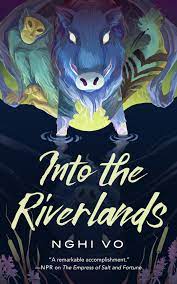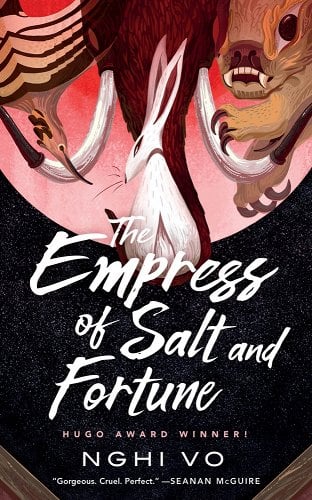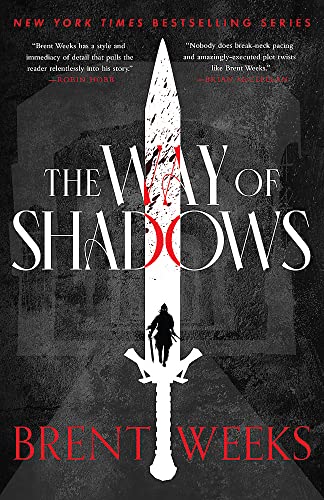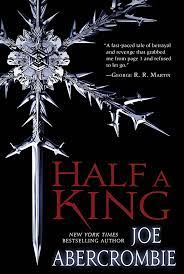|
I talked about Nghi Vo's fantasy series The Singing Hills Cycle a few months ago. The books follow a cleric named Chih, whose religious order focuses more on history than faith. In this third entry, Into the Riverlands, Chih is once again traveling the land, looking for stories to collect. If you haven't read the first two, that's fine. Each novella stands independently.
Vo's prose style is quite good, and her storytelling is masterful. You don't know the details of the plot, going in, but you recognize right away that you're in for a good story. It's a blend of adventure and magic with a setting that recalls the hinterlands of Imperial China, only gayer. Vo's characters express a variety of genders and sexual orientations. And while there are lots of sections with fast action and tense battles with bad guys, the book has a contemplative feel. By which I mean I cried several times.
0 Comments
The Empress of Salt and Fortune is a hell of a good book, the first of a series of four historical fantasy novellas by Nghi Vo. You know from the start it's going to be good because the main character is an archivist. As a cleric, Chih is responsible for recording oral history. Their interviewee is an older woman, Rabbit, who recalls attending the empress in her youth.
Some people are good writers and some people are good storytellers and the overlap of those two groups is not as big as you might expect. Vo does both things right. The style of the prose is pitch-perfect. The rhythms and inflections make you feel like you're sitting by the fire. The plot is palace intrigue and adventure and scheming. It's hard not to compare Vo to Becky Chambers, who also writes a speculative fiction series of character-driven novellas with a nonbinary protagonist, starting with A Psalm for the Wild-Built. I was also reminded of Leigh Bardugo's fable-inflected prose. Or you could compare it to Friend Green Tomatoes. A member of the younger generation interviews an older woman who recalls her friendship with another woman. They struggle to survive in a world run by abusive men, and you can never fully decide whether they were friends or lovers. (That's the movie. It's been decades, but if I recall correctly, their relationship in the movie was ambiguous and their relationship in the book was Yep We're Lesbians Now). This hit all the right notes. I need to finish listening to Cindy Kay narrate the rest of the series (I'm in book 2 currently) so I may have to skip next week's book talk. Actually yeah, that's a good idea regardless. I'm traveling to North Carolina for a few days next week, so it's a convenient time for a break. Everyone enjoy the first day of decorative gourd season! I had fun getting lost in Brent Weeks's Night Angel trilogy, starting with The Way of Shadows. In the slums of a city where crime lords hold the power, a street urchin named Azoth tracks down the deadliest assassin the world, Durzo Blint, and begs to become his apprentice. Blint reluctantly agrees to train Azoth, but only if he first kills the sadistic leader of his street gang.
Weeks makes ample use of fantasy tropes. That kid living on the streets? Spoiler, he's the chosen one. His teacher is a worn-out assassin, grown cynical and weary after these many years of being alone; his girlfriend is a young, morally pure woman who acts as an externalized conscience; his mother-figure is a hooker with a heart of gold. Other fantasy elements will be familiar, such as legendary enchanted objects and mad wizards. I'm generally okay with this as a reader. One of the joys of genre fiction is seeing how different authors handle different genre conventions. But there are some tropes that could stand to go into retirement, notably: Violence against women as the plot device that motivates the main character to achieve his destiny. I enjoyed the adventure and careful plotting within the books. These are not advisable if you prefer to avoid violence, but if you can tolerate some squicky scenes, these are adventure-filled, plot-driven stories that will satisfy the itch when you want action and magic. I particularly recommend the audiobooks, since Simon Vance is such an enjoyable narrator. A version of this post originally appeared on March 25, 2023.
I read Joe Abercrombie's Shattered Sea trilogy: Half a King, Half the World, and Half a War, capably narrated by John Keating. The books are marketed as grimdark fantasy, and you can tell the setting is an alternative, medievalesque Scandinavia, though more than anything they feel like adventure stories. The pace is go-go-go, and the battles are plentiful. Be prepared for some extremely descriptive scenes of violence, though no sexual violence. Thank you for that, Mr. Abercrombie. Prince Yarvi is prepared to enter the ministry, where he will learn to advise kings, when his father and brother are killed in an ambush. No one is happy about this. Because of a birth defect, Yarvi has only one functional hand. This shouldn't matter. He's a head of state, not a concert pianist. But people are not enlightened in their understanding of disability. Abercrombie's portrayal of disability is unusually good. Yarvi doesn't become a Magical Disabled Person. He doesn't develop special abilities to compensate. His life is much harder, and people treat him poorly. The storytelling is strong, and more than anything, that's what sells books--but there are some places where the prose could have been stronger. I know you guys are sick of hearing me talk about this, but the dialogue tags, I swear. If I took a drink every time someone murmured, I'd have wound up in the emergency room, getting my stomach pumped. There were also a ton of mutterings, mumblings, and growlings. A snarl is an inarticulate noise. It is cool to take poetic license with that occasionally, but if you repeatedly insist on using it as a dialogue tag, it becomes a tic. Instead of: "I'm going to chop your fucking head off," she snarled. go with: "I'm going to chop your fucking head off," she said. Or even better: "I'm going to chop your fucking head off." She raised her axe to his temple. Not everyone gets fussy about overused words (or maybe y'all are just better at tolerating alcohol poisoning) but strong prose craft leads to stronger characters, more emotional depth, and more meaningful plot development. Strong prose supports strong action, and makes you care when a secondary character takes an axe to his temple. Another example: two of the women characters are warriors. To underscore their gender defiance, they are sometimes depicted as picking their noses and doing interesting things with the boogers. This can work once, but only once. Five or six times in a series? That's a bit much. Do it once to make your point, then settle back. But again: these books have strong storytelling with a cast of well developed primary characters, and I have no hesitation recommending them if you're looking for violent, action-packed books that are light on the fantasy and heavy on the political intrigue. |
Book talks
When Covid first hit, I started doing book talks on social media as a way to keep in touch with people. I never got out of the habit. I don't discuss books by my clients, and if I don't like a book, I won't discuss it at all. While I will sometimes focus on craft or offer gentle critical perspectives, as a matter of professional courtesy, I don't trash writers. Unless they're dead. Then the gloves come off. Archives
February 2024
Tags
All
|





 RSS Feed
RSS Feed